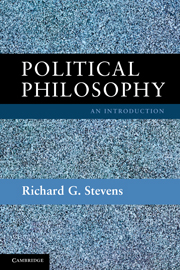Book contents
- Frontmatter
- Contents
- Acknowledgments
- Prologue
- Part I The Nature And Origin Of Political Philosophy
- 1 What Philosophy Is
- 2 The Origin of Philosophy
- 3 The Nature of Politics
- 4 The Origin of Political Philosophy
- Part Two The Problem Of Political Philosophy
- Part III The Permutations Of Political Philosophy
- Epilogue
- Index
- References
2 - The Origin of Philosophy
Published online by Cambridge University Press: 05 June 2012
- Frontmatter
- Contents
- Acknowledgments
- Prologue
- Part I The Nature And Origin Of Political Philosophy
- 1 What Philosophy Is
- 2 The Origin of Philosophy
- 3 The Nature of Politics
- 4 The Origin of Political Philosophy
- Part Two The Problem Of Political Philosophy
- Part III The Permutations Of Political Philosophy
- Epilogue
- Index
- References
Summary
The motion picture Casablanca was made in 1942. The song “As Time Goes By” was a prominent part of the movie. It made the point that the meaning of some events and some words, such as the words “kiss” and “sigh,” remain solidly fixed. That is pretty straightforward. One may kiss a hand, and that is still a kiss, but if one pats a hand comfortingly, that is not a kiss. The executioner who beheaded Lady Jane Grey in 1554 may have sighed resignedly as he did so or he may have bellowed with fury, but if he did one, he did not do the other. A sigh is just a sigh, and no one in his right mind would hear someone bellow and call it a sigh. After all, the fundamental things apply as time goes by – or do they?
Having gone Through the Looking-Glass, Alice in due course encountered Humpty Dumpty. During their conversation, Humpty Dumpty used the word “glory.” Alice asked what he meant, and he replied that he meant a nice, knockdown argument, so Alice objected that that was not what “glory” meant. “‘When I use a word,’ Humpty Dumpty said, in a rather scornful tone, ‘it means just what I choose it to mean – neither more nor less.’” Alice was seven and a half years old when she had this conversation with the mature Humpty Dumpty, but it is clear that she was right. For, if Humpty Dumpty was right, then he was just as much wrong, because right and wrong do not mean anything because nothing means anything. Conversation is impossible. Reading is a waste of time, if indeed there are such things as waste and time.
- Type
- Chapter
- Information
- Political PhilosophyAn Introduction, pp. 19 - 51Publisher: Cambridge University PressPrint publication year: 2010



